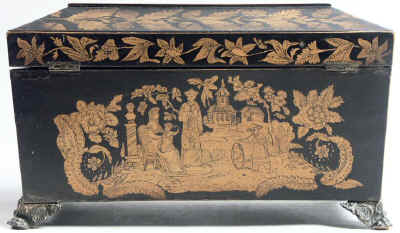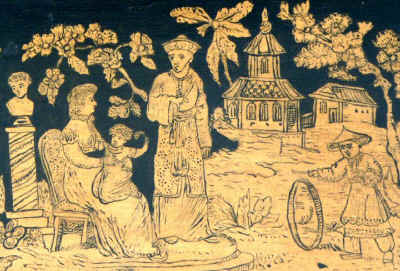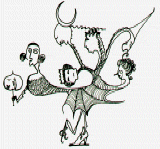|
| |
Exquisite Antique Face Screen with rare color painting Circa 1820
Please click on images to enlarge | slide show | thumbnail index |
high resolution
|
Description:
Ref: 168fs http://hygra.com/face/168fs
Antique Face screen with rare color painting circa 1820
The central scene is an orchestration of social history filtered
through the imagination of the artist who composed it. The setting is an
oriental garden complete with pavilions and exotic flora.
The exotically dressed child playing with his hoop strikes a joyful
note A richly dressed oriental figure stands by the seated lady who is
holding a child. The lady is European and is opulently dressed. Behind
them there is a column with a neoclassical bust on top A very unusual
combination of oriental and European elements hinting at the
then newly triggered interaction of the two cultures.
The surround is a finely drawn composition of stylized flora, with
echoes of "black-work" embroidery introduced to England by
Catherine of Aragon and reminiscent of Indian paisley
embroideries and prints.
The handle is exquisitely turned ebony. The tapered section in the
middle has been then milled some sections have been gilded.
Origin: UK; Circa:
1820; Materials: .
Size: Screen 23,6 cm wide by 17.5 cm;
handle 23.5 cm long: 9.3 inches wide
by 6.9 inches; handle 9.3 inches long.
Condition:
Please refer to the photographs for details of condition.
Keywords: Hygra.com, Antique
box, Antique Face Screen, fan, fire screen penwork, pen and ink,
color, Chinoiserie, Cathay
Request
current list of available sewing boxes with prices.
Request
current list of available writing boxes with prices.
Request
current list of available jewelry boxes with prices.
Request
current list of available tea caddies with prices.
Request
current list of available Face Screens with prices.
boxes@hygra.com
|
Request
current list of available Face Screens with prices.
 (Small).JPG)
|

The scene is unusual: on the
left there is a classical pillar with bust on top, then a woman sitting
with child on lap. Then a clerical gentleman. (Small).JPG)
The central scene is an orchestration of social history filtered
through the imagination of the artist who composed it. The setting is an
oriental garden complete with pavilions and exotic flora.
The exotically dressed child playing with his hoop strikes a joyful
note A richly dressed oriental figure stands by the seated lady who is
holding a child. The lady is European and is opulently dressed. Behind
them there is a column with a neoclassical bust on top A very unusual
combination of oriental and European elements hinting at the
then newly triggered interaction of the two cultures.
The gold ornaments on the oriental figures clothes are echoed on the woman's
dress hinting at the allure of the East, which was enchanting and
enveloping the Europeans.
The surround is a finely drawn composition of stylized flora, with
echoes of "black-work" embroidery introduced to England by
Catherine of Aragon and reminiscent of Indian paisley
embroideries and prints.
The pattern starts symmetrically, but when it comes to the top an
element of rococo is introduced with the variations on each side. This
harmonises perfectly with the main picture and gives the whole
composition added vigour. Note the stylized tulip which follows the
contours of the cut form of the screen. The detailed intricacy of
the whole is a rich feast for the eyes and imagination
|
The little boy
with the hoop is on another of the screens:
The entire scene is on the
back of a Regency tea chest decorated in penwork which is now in a
private collection, which I documented in:

Hygra: A Regency Penwork Three Compartment Tea Caddy circa 1820
The scene is unusual: on the
left there is a classical pillar with bust on top, then a woman sitting
with child on lap. Then a clerical gentleman. The boy on the right with
the hoop seems to be in Chinese clothes. The whole composition is
Chinese inspiration: an island of Cathay fantasy. 
Is this the same boy?
%20(Small).JPG)
|
Please click on images to enlarge | slide show | thumbnail index |
 (Small).JPG)
|
The other side the scene is
in the Chinoiserie tradition. Two men one sitting seem to meet in an
Oriental garden with a low fence and exotic plants.
|
Please click on images to enlarge | slide show | thumbnail index |
| Is this A missionary? His church in the background? |
 (Small).JPG)
|
Please click on images to enlarge | slide show | thumbnail index |
 (Small).JPG)
|
The handle is exquisitely turned ebony. The tapered
section in the middle has been then milled: an external controllable
cutting tool is applied. I keep looking and I am not certain it wasn't
carved. It may be a mixture of the two.
Some of the cavetto grooves have been gilded to give accent.
Imagine twirling this between your fingers in candle and firelight
The turning is sharp and precise.
See: Hygra: Ornamental Turning |
Please click on images to enlarge | slide show | thumbnail index |
 (Small).JPG)
|
An European woman sits with her rattle waving child in smock on lap.
Behind her is a pillar with bust of idealized classical woman with
a look of disdain.
There are some losses to the
upper layer of paintwork. Both of the figures have been overprinted
in colours and gold.
The upper part of the Clerics
frock has flaked off.
|
Please click on images to enlarge | slide show | thumbnail index |
All text and images and linked images are ©
1999-2015 Antigone Clarke and Joseph O'Kelly. If you require any further
information on permitted use, or a licence to republish any material, email us
at copyright@hygra.com
|
